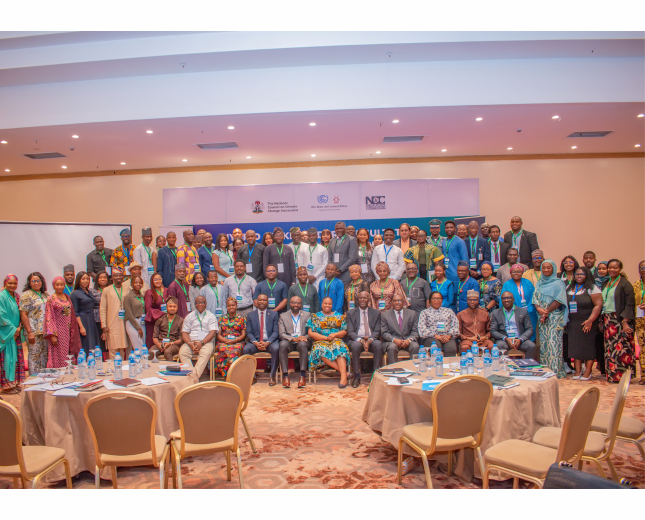Background
Carbon pricing is widely recognised as an effective tool for reducing greenhouse gas emissions by assigning a monetary value to carbon, driving investments in low-carbon solutions. Globally, 75 carbon pricing instruments, including 39 carbon taxes and 36 emissions trading systems (ETS), reflect a growing commitment to market-based climate strategies. These mechanisms support achieving Nationally Determined Contributions (NDCs) and advancing long-term low-carbon development strategies.
Nigeria’s updated NDC targets a 20% unconditional and 47% conditional reduction in emissions by 2030. To meet these goals, the country is pursuing a multi-faceted approach, with carbon pricing playing a key role.
Under the Collaborative Instruments for Ambitious Climate Action (CiACA) initiative implemented through the Regional Collaboration Centre for West and Central Africa (RCC WAC Africa), a feasibility study was conducted which recommended prioritising a carbon tax for its simplicity and immediate applicability, especially in high-emission sectors like telecommunications. This sector, reliant on diesel-powered infrastructure consuming over 50 million litres of diesel monthly, significantly contributes to greenhouse gas emissions.
With the support of the UN Climate Change through the RCC WAC Africa, the National Council on Climate Change Secretariat in collaboration Nigerian Communications Commission organised a stakeholder consultation workshop where the insights, perspectives, and experiences of the relevant stakeholders is crucial to develop a carbon pricing mechanism that is both effective and feasible for Nigeria’s telecommunications sector. By aligning perspectives across key sectors, the workshop aims to ensure the adopted carbon pricing mechanism is equitable, effective, and widely supported, paving the way for successful implementation and long-term sustainability.
Objectives
The workshop aims to provide a platform for stakeholders to collaboratively explore the design and implementation of a pilot carbon tax in the telecommunications sector.
The specific objectives of the workshop include:
- Provide participants with a detailed understanding of carbon pricing, including its purpose, different approaches (e.g., carbon taxes and emissions trading systems), and initiatives in Africa and globally.
- Strengthen the capacity of key stakeholders and sector players by equipping them with the knowledge necessary to make informed decisions on pilot carbon tax and its implications for emissions reduction and low-carbon development.
- Highlight the potential of carbon pricing (especially the proposed carbon tax) to contribute to achieving NDCs, including unconditional targets, while supporting broader low-carbon development goals.
- Facilitate discussions to ensure the practicality, inclusivity, and effectiveness of a carbon tax design, reflecting the interests and concerns of diverse stakeholders in the telecommunications sector.
- Gather input from stakeholders on the feasibility, practicality, and design of the proposed carbon tax, including Monitoring, Reporting, and Verification (MRV) requirements, revenue recycling mechanisms, and potential overlaps with existing fiscal policies.
- Discuss potential uses of revenues generated through carbon pricing, emphasizing their role in funding mitigation and adaptation actions under the NDC framework.
- Demonstrate the connections between carbon pricing and key elements of international climate policy, including climate finance, MRV, transparency frameworks, and cooperative action under Article 6.
Key Outcomes
- The workshop successfully brought together over 110 diverse stakeholders who participated online and in-person, including government agencies, private sector representatives, civil society, and academia.
- The workshop provided a valuable platform for initial engagement, allowing key stakeholders to exchange views on the opportunities and challenges of the pilot carbon tax in advancing Nigeria’s decarbonization efforts.
- A recurring concern raised by telecom stakeholders was the rationale for selecting their sector for the pilot carbon tax, with some arguing that the sector is not a major emitter compared to others like oil and gas or manufacturing. There were also concerns regarding recent tariff hikes.
- Additionally, telecom operators highlighted that they have already made significant strides in decarbonization, implementing renewable energy solutions and energy efficiency innovations. They emphasized the importance of the National Council on Climate Change Secretariat (NCCC-S) gaining a deeper understanding of their sector’s sustainability efforts before advancing work on this initiative.
- Despite these concerns, the workshop underscored the broad institutional support for the pilot carbon tax, with endorsements from various government departments, the Nigerian Communications Commission (NCC), state-level representatives, Nigeria Governors Forum, the presidency, etc.
- There was a clear consensus that more extensive discussions and consultations are required with the telecom operators including those who were unable to attend the workshop through their umbrella organisations (National Communication Commission) to help identify and address all concerns to foster trust, ownership of the process and enhance the pilot’s credibility among sector players.
- The NCCC-S, various government representatives and partners reiterated that this work will be undertaken based on principles of transparency, equity and inclusivity.
